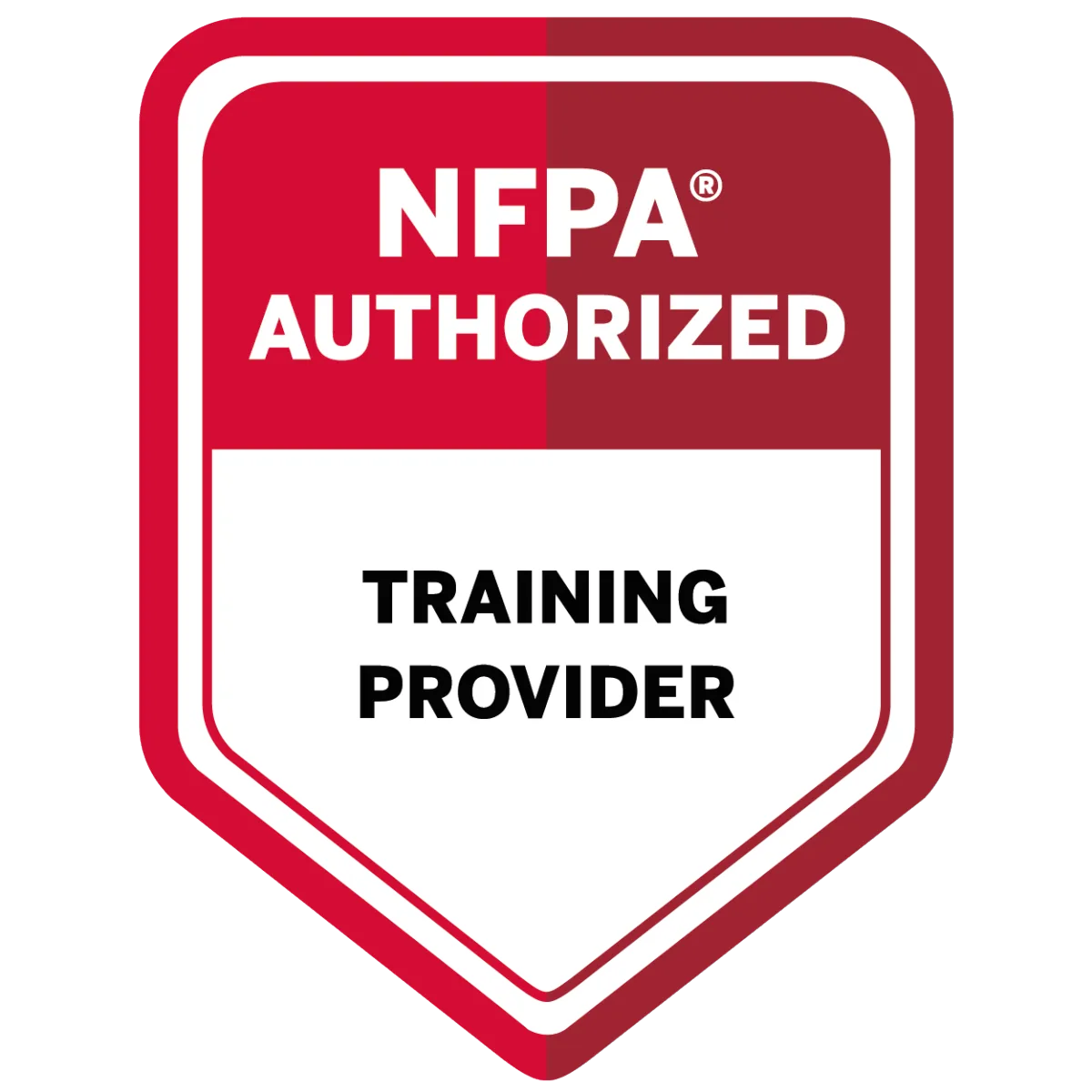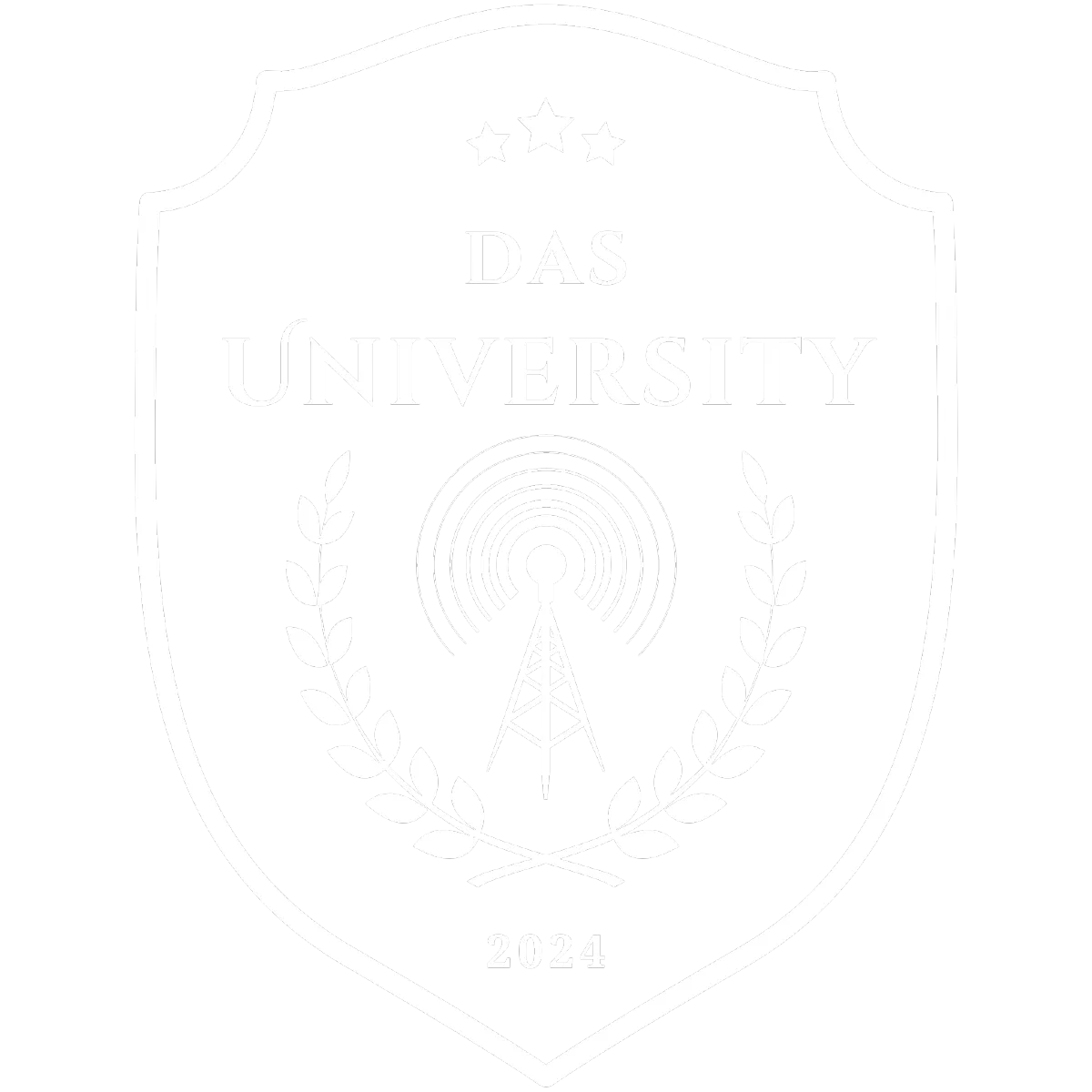Explore Our Unique Educational Platform
Join thousands of safety professionals, fire marshals, inspectors, integrators, and builders who are mastering the skills to install, certify, and inspect mission-critical in-building radio systems. With on-demand training, you can learn at your pace, apply it in the field, and start making buildings safer immediately.
Upgrade to our premium platform and gain the ability to earn DAS University training certificates and ICC continuing education credits for every hour of training completed. Whether you’re advancing your career, meeting code compliance requirements, or training your team, DAS University provides the recognition and real-world knowledge you need to lead with confidence.

Virtual Learning Environment
Step into our cutting-edge
virtual learning spaces, equipped with the latest tools and resources tailored for
DAS ERCES training. Experience live webinars, interactive certificate courses, and real-time collaboration with peers and instructors, ensuring an engaging and hands-on educational journey.

Professional Development
We train you on what matters: real installation standards, testing protocols, and life-saving communication system design. Our expert-led courses help you
earn DAS University training certificates, connect to job placement pipelines, and gain the confidence to lead projects with AHJs, architects, and public safety officials.

Global and Inclusive Community
Join a powerful network of safety-first professionals from across the country and around the world. With 24/7 access to our online campus, and a shared mission to protect lives, you’re never learning alone. DAS University is your community for growth, connection, and career elevation.
AUTHORIZED TRAINING PARTNERS OF THE BELOW ORGANIZATIONS

Earn CEU credits for every course on our Premium platform


About DAS University
Pioneering the Future of Education
At DAS University, we are redefining the educational landscape by integrating state-of-the-art technology with personalized learning experiences. Our mission is to empower students globally with the skills and knowledge necessary to excel in the fast-growing fields of
Distributed Antenna Systems (DAS) and Emergency Responder Communication Enhancement Systems (ERCES).
Through a blend of expert-led training courses, real-world applications
, and a supportive community, we provide an unparalleled learning journey for professionals and beginners alike.
Whether you're pursuing ERCES training, exploring advanced DAS education, or preparing for real-world challenges, we ensure you’re equipped for success. Join DAS University and transform your potential into leadership in the industry.
Achieve Training Certificates at DAS University
Elevate your professional profile with our highly regarded
DAS and ERCES training courses. Designed to provide both foundational and advanced expertise, these programs prepare you for real-world challenges in the
DAS and in-building communications industry.
Gain cutting-edge knowledge, practical skills, and DAS University training credentials to advance your career in public safety communications, emergency responder technologies, and beyond.
Hands-on project submissions
Industry-recognized guest speakers
Collaboration with 30+ industry partners
Real-time system testing simulations
Access to exclusive ERCES webinars
Unlock Your Career Potential with DAS University Training Certificates
Our DAS and ERCES training certificates document your completion—they open doors to new professional opportunities in the growing field of in-building communication systems.
Our training program participants develop practical skills for the industry, DAS University powered by Gamma is your gateway to professional growth and success. Whether you’re aiming for job placements, advanced career counseling, or building connections within a robust network of industry leaders, our programs are designed for your advancement.
Sign up now for FREE and start your journey toward professional excellence with DAS University!

Collaborating with Local Authorities for Effective DAS Deployment
Deploying a Distributed Antenna System (DAS) is a complex process that requires careful planning, technical expertise, and collaboration with various stakeholders. One of the critical aspects of a successful DAS deployment is working closely with local authorities. At DAS University, we emphasize the importance of this collaboration to ensure compliance with regulations, enhance public safety, and achieve optimal system performance. This blog post explores the benefits of collaborating with local authorities, the key stakeholders involved, and best practices for effective DAS deployment.
The Importance of Collaboration
Regulatory Compliance: Local authorities enforce building codes and regulations that mandate certain standards for in-building wireless communications, especially for public safety. Collaborating with these authorities ensures that the DAS meets all legal requirements, avoiding potential fines and ensuring occupant safety.
Public Safety: Effective communication is critical for emergency responders. Local authorities, including fire and police departments, can provide valuable insights into the specific communication needs and challenges within their jurisdiction, ensuring the DAS enhances public safety.
Streamlined Approval Process: Engaging with local authorities early in the project can expedite the approval process. By understanding their requirements and addressing concerns upfront, project delays can be minimized.
Community Support: Building a positive relationship with local authorities fosters community trust and support. This can be particularly beneficial in gaining public approval for large-scale projects.
Key Stakeholders
Building and Planning Departments: These departments oversee building codes, zoning regulations, and construction permits. They ensure that the DAS installation complies with all structural and safety standards.
Fire Departments: Fire departments have specific requirements for in-building communication systems to ensure that firefighters can communicate effectively during emergencies. They may require regular testing and certification of the DAS.
Police Departments: Police departments often have their own communication needs and standards. Their input can help tailor the DAS to support law enforcement operations within the building.
Public Safety Communication Officials: These officials manage emergency communication systems and can provide guidance on integrating the DAS with existing public safety networks.
Telecommunications Regulatory Bodies: Organizations such as the Federal Communications Commission (FCC) in the United States regulate the use of radio frequencies and communication equipment. Compliance with their standards is essential for legal operation.
Best Practices for Collaboration
Early Engagement
Initiate Contact Early: Engage with local authorities at the outset of the project. Early communication helps identify potential issues and sets the stage for a cooperative relationship.
Pre-Design Consultation: Before finalizing the DAS design, consult with relevant authorities to understand their requirements and incorporate their feedback.
Clear Communication
Transparent Plans: Share detailed plans and timelines with local authorities. Transparency builds trust and ensures all parties are on the same page.
Regular Updates: Provide regular updates on project progress and any changes to the plan. Keep authorities informed to avoid surprises and build confidence in the project’s success.
Compliance and Documentation
Adhere to Standards: Ensure that the DAS complies with all relevant codes, standards, and regulations. This includes fire codes, building codes, and communication standards.
Maintain Records: Keep detailed records of all interactions, approvals, and certifications. Proper documentation can expedite future inspections and audits.
Joint Inspections and Testing
Collaborative Testing: Conduct joint inspections and testing with local authorities to ensure the DAS meets all requirements. Address any issues promptly and transparently.
Regular Maintenance Checks: Establish a schedule for regular maintenance and testing, involving local authorities to maintain compliance and system performance.
Community Engagement
Public Meetings: Participate in public meetings to inform the community about the DAS project. Address any concerns and highlight the benefits of improved public safety and communication.
Educational Outreach: Educate the community and building occupants about the DAS and how it enhances safety and communication. Awareness can foster support and cooperation.
Leveraging Technology
Use Advanced Tools: Utilize advanced design and planning tools to create detailed and accurate DAS plans. This can help address technical concerns and demonstrate the system’s effectiveness.
Remote Monitoring: Implement remote monitoring capabilities to ensure continuous compliance and performance. Share monitoring data with local authorities to maintain transparency.
Conclusion
Collaborating with local authorities is crucial for the successful deployment of Distributed Antenna Systems (DAS). By engaging early, maintaining clear communication, adhering to regulations, and involving the community, project leaders can ensure that their DAS meets all requirements and enhances public safety. At DAS University, we prepare professionals to navigate these complex collaborations and achieve effective DAS deployment. Join us to learn more about best practices in DAS implementation and become a leader in the field of in-building wireless communication.
Hear Directly from Our Students: Real Stories, Real Success
Discover the impact of DAS University through the voices of our students. From groundbreaking education to career breakthroughs, our learners share their journeys and the transformative experiences they've encountered.

DAS University not only taught me the technical skills needed for advanced DAS systems but also how to apply them effectively in real-world scenarios. The network I’ve built through the university’s alumni connections has opened up numerous opportunities for collaboration and growth.

Raj Patel

The DAS training certificate has been beneficial for my career. The practical knowledge and hands-on training I received have allowed me to transition into a higher role within my company. The support and expert advice from faculty were invaluable.

Emily Nguyen

Enrolling at DAS University was one of the best decisions I've made for my professional development. The interactive courses and live sessions with industry experts have greatly enhanced my understanding and confidence in handling complex projects in my field.

Albert Dubois
Start Your Journey at DAS University Today
Embark on a transformative path of discovery and professional growth with our cutting-edge
DAS and ERCES training courses and a vibrant academic community. At DAS University, we provide the tools, resources, and industry connections to help you not just meet but exceed your career aspirations in the fields of
Distributed Antenna Systems (DAS) and Emergency Responder Communication Enhancement Systems (ERCES).
Whether you’re aiming to gain DAS University training certificates, explore real-world applications, or network with industry professionals, DAS University is here to turn your potential into measurable success.
Our Latest Articles

Collaborating with Local Authorities for Effective DAS Deployment
Deploying a Distributed Antenna System (DAS) is a complex process that requires careful planning, technical expertise, and collaboration with various stakeholders. One of the critical aspects of a successful DAS deployment is working closely with local authorities. At DAS University, we emphasize the importance of this collaboration to ensure compliance with regulations, enhance public safety, and achieve optimal system performance. This blog post explores the benefits of collaborating with local authorities, the key stakeholders involved, and best practices for effective DAS deployment.
The Importance of Collaboration
Regulatory Compliance: Local authorities enforce building codes and regulations that mandate certain standards for in-building wireless communications, especially for public safety. Collaborating with these authorities ensures that the DAS meets all legal requirements, avoiding potential fines and ensuring occupant safety.
Public Safety: Effective communication is critical for emergency responders. Local authorities, including fire and police departments, can provide valuable insights into the specific communication needs and challenges within their jurisdiction, ensuring the DAS enhances public safety.
Streamlined Approval Process: Engaging with local authorities early in the project can expedite the approval process. By understanding their requirements and addressing concerns upfront, project delays can be minimized.
Community Support: Building a positive relationship with local authorities fosters community trust and support. This can be particularly beneficial in gaining public approval for large-scale projects.
Key Stakeholders
Building and Planning Departments: These departments oversee building codes, zoning regulations, and construction permits. They ensure that the DAS installation complies with all structural and safety standards.
Fire Departments: Fire departments have specific requirements for in-building communication systems to ensure that firefighters can communicate effectively during emergencies. They may require regular testing and certification of the DAS.
Police Departments: Police departments often have their own communication needs and standards. Their input can help tailor the DAS to support law enforcement operations within the building.
Public Safety Communication Officials: These officials manage emergency communication systems and can provide guidance on integrating the DAS with existing public safety networks.
Telecommunications Regulatory Bodies: Organizations such as the Federal Communications Commission (FCC) in the United States regulate the use of radio frequencies and communication equipment. Compliance with their standards is essential for legal operation.
Best Practices for Collaboration
Early Engagement
Initiate Contact Early: Engage with local authorities at the outset of the project. Early communication helps identify potential issues and sets the stage for a cooperative relationship.
Pre-Design Consultation: Before finalizing the DAS design, consult with relevant authorities to understand their requirements and incorporate their feedback.
Clear Communication
Transparent Plans: Share detailed plans and timelines with local authorities. Transparency builds trust and ensures all parties are on the same page.
Regular Updates: Provide regular updates on project progress and any changes to the plan. Keep authorities informed to avoid surprises and build confidence in the project’s success.
Compliance and Documentation
Adhere to Standards: Ensure that the DAS complies with all relevant codes, standards, and regulations. This includes fire codes, building codes, and communication standards.
Maintain Records: Keep detailed records of all interactions, approvals, and certifications. Proper documentation can expedite future inspections and audits.
Joint Inspections and Testing
Collaborative Testing: Conduct joint inspections and testing with local authorities to ensure the DAS meets all requirements. Address any issues promptly and transparently.
Regular Maintenance Checks: Establish a schedule for regular maintenance and testing, involving local authorities to maintain compliance and system performance.
Community Engagement
Public Meetings: Participate in public meetings to inform the community about the DAS project. Address any concerns and highlight the benefits of improved public safety and communication.
Educational Outreach: Educate the community and building occupants about the DAS and how it enhances safety and communication. Awareness can foster support and cooperation.
Leveraging Technology
Use Advanced Tools: Utilize advanced design and planning tools to create detailed and accurate DAS plans. This can help address technical concerns and demonstrate the system’s effectiveness.
Remote Monitoring: Implement remote monitoring capabilities to ensure continuous compliance and performance. Share monitoring data with local authorities to maintain transparency.
Conclusion
Collaborating with local authorities is crucial for the successful deployment of Distributed Antenna Systems (DAS). By engaging early, maintaining clear communication, adhering to regulations, and involving the community, project leaders can ensure that their DAS meets all requirements and enhances public safety. At DAS University, we prepare professionals to navigate these complex collaborations and achieve effective DAS deployment. Join us to learn more about best practices in DAS implementation and become a leader in the field of in-building wireless communication.
Frequently Asked Questions
What makes DAS University different from traditional educational institutions?
DAS University combines expert-led courses, dynamic online interactions, and live events to create a comprehensive and interactive learning experience that goes beyond traditional classroom boundaries.
How does the subscription model work at DAS University?
Our subscription model offers unlimited access to all courses and resources on the platform, allowing students to learn at their own pace and according to their own schedules. Enjoy a FREE version and premium version
What types of courses does DAS University offer?
We offer a wide range of courses focused on Distributed Antenna Systems (DAS), including basics of radio frequency, system design, and emergency responder communication enhancement systems, among others.
Can I interact directly with instructors and guest speakers?
Yes, our platform includes real-time chat, discussion forums, and weekly live Zoom sessions where students can engage directly with instructors and industry experts.
What are the career opportunities after completing courses at DAS University?
Completing courses at DAS University can lead to various roles in the DAS industry, such as system integrator, radio technician, and various positions in emergency response, depending on the course.
How do I access the digital library?
The digital library is available through the Campus portal, where students can access research papers, case studies, e-books, and multimedia resources related to their courses.
What is included in the certification from DAS University?
Training certificates include your name, course title, completion date, unique certificate number, and document your completion of DAS University training programs
How can I participate in special interest groups and clubs?
Students can join various groups and clubs through the Campus portal, allowing them to connect with peers who share similar interests and professional goals. Premium Version only
Are there resources for hands-on learning in DAS University courses?
Yes, we provide simulation tools and virtual labs for hands-on experience, as well as gamified learning modules to make complex concepts more engaging. Only available in the Premium version.
What support is available if I encounter difficulties in my coursework?
The Feedback and Support Center offers direct access to faculty and technical support to assist with any course-related inquiries.
How does DAS University accommodate international students?
We offer 24/7 campus access and multilingual support to ensure that students from all time zones and linguistic backgrounds can fully participate.
What is the process for obtaining certification at DAS University?
To obtain a training certificate, students must complete all modules, pass the final assessment with a required minimum score, and actively participate in live sessions and forums. Only available in the Premium version.
Can I share my certification on professional networks?
Yes, upon completion, students receive both a physical training certificate and a digital badge that can be shared on LinkedIn and other professional networks. Only available in the Premium version.
What are the live webinar auditoriums used for?
The auditoriums host weekly live sessions with guest speakers and industry pofessionals, featuring interactive Q&A sessions and panel discussions.
What tools are available for career development at DAS University?
Our Career Center provides career counseling, resume workshops, job postings, and an alumni network for mentorship and professional connections. Only available in the Premium version.
How can I track my course progress and assessments?
The Certification Portal on our platform allows students to track their progress, assessments, and training certificate status.
What kind of assessments are used in DAS University courses?
Assessments include quizzes, assignments, project submissions, and a final examination to comprehensively test understanding and practical application.
How can I continue learning after completing my courses?
Certificate holders are encouraged to participate in advanced courses, seminars, and periodic refresher courses to keep their knowledge current.
Are there opportunities for networking within the DAS University community?
Yes, training certificate completion grants access to an alumni network, facilitating peer interactions, knowledge sharing, and networking opportunities. Only available in the Premium version.
How do I provide feedback on my learning experience?
Students can provide feedback through forums in the Feedback and Support Center, helping us to continually improve the campus experience.




